Main CPGW Record
Surname: SLINGSBY
Forename(s): Anthony Edward King
Place of Birth: Carleton-in-Craven, Yorkshire
Service No: ---
Rank: Lieutenant
Regiment / Corps / Service: Duke of Wellington’s (West Riding Regiment)
Battalion / Unit: 1/6th Battalion
Division: 49th (West Riding) Division
Age: 26
Date of Death: 1915-07-15
Awards: ---
CWGC Grave / Memorial Reference: I. E. 14.
CWGC Cemetery: BARD COTTAGE CEMETERY
CWGC Memorial: ---
Non-CWGC Burial: ---
Local War Memorial: CARLETON-IN-CRAVEN, YORKSHIRE
Additional Information:
Anthony Edward King Slingsby (born 20 April 1889) was the son of John Arthur and Amelia Frederica Slingsby, née Morris (both born at Carleton-in-Craven, Yorkshire) and brother of Captain Arthur Morris Slingsby (q.v.); Lieutenant Stephen Henry Slingsby (q.v.); cousin of 2nd Lieutenant Charles Slingsby (q.v.) and a relative of Capt. Henry Laurence Slingsby (q.v.).
1891 Carleton-in-Craven, Yorkshire Census: Carla Beck - Anthony E.K. Slingsby, aged 1 years, born Carleton, son of John A. and Amelia F. Slingsby.
1901 Shottermill, Surrey Census: St Edmund's School, Hindhead - Antony Slingsby, aged 11 years, born Skipton-in-Craven, Yorkshire.
1911 Carleton-in-Craven, Yorkshire Census: Carla Beck - Anthony Edward King Slingsby, aged 21 years, born Carleton-in-Craven, son of John Arthur and Amelia Frederica Slingsby.
British Army WW1 Medal Rolls Index Cards: Lieut Anthony Edward King Slingsby, 1/6th West Riding Regiment. Theatre of War first served in: 1 - France. Date of entry therein: 14 April 1915. Correspondence: Lt P.B. Slingsby forwards application for self and three deceased brothers medals 4 August 1921. Address 1: Clifton, York. Address 2: Waverley, Moor Lane, Great Crosby, Nr. Liverpool. Medals to be sent to J.A. Slingsby Esq. Carla Beck, Carleton in Craven, Skipton, Yorks.
Anthony is in the photograph of officers in CPGW book (page 44).
See also: ‘Guiseley Terriers: A Small Part in The Great War – A History of the 1/6th Battalion, Duke of Wellington’s (West Riding) Regiment’ by Stephen Barber (2018).
Data Source: Craven’s Part in the Great War - original CPGW book entry
View Entry in CPGW BookEntry in West Yorkshire Pioneer Illustrated War Record:
SLINGSBY, Lieutenant A.E.K., aged 26, West Riding Regiment, son of Mr. J.A. Slingsby, J.P., and Mrs. Slingsby, of Carla Beck, Carleton, killed in action July 14, 1915.
---
Click the thumbnail below to view a larger image.
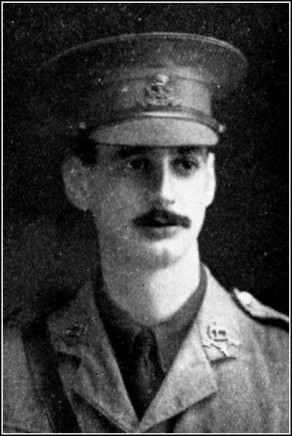
Lieutenant Anthony Edward King SLINGSBY
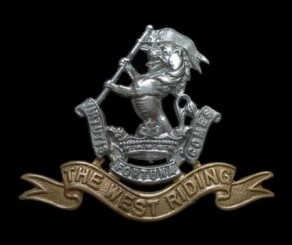
Regiment / Corps / Service Badge: Duke of Wellington’s (West Riding Regiment)

Divisional Sign / Service Insignia: 49th (West Riding) Division
Data from Soldiers Died in the Great War 1914 - 1919 Records
Soldiers Died Data for Soldier Records
Surname: SLINGSBY
Forename(s): Anthony Edward King
Born:
Residence:
Enlisted:
Number:
Rank: Lt
Regiment: Duke of Wellington's (West Riding Regiment)
Battalion: 6th Battalion (Territorial)
Decorations:
Died Date: 16/07/15 [sic]
Died How: Killed in action
Theatre of War:
Notes:
Data from Commonwealth War Graves Commission Records
CWGC Data for Soldier Records
Surname: SLINGSBY
Forename(s): Anthony Edward King
Country of Service: United Kingdom
Service Number:
Rank: Lieutenant
Regiment: Duke of Wellington's (West Riding Regiment)
Unit: 1st/6th Bn.
Age: 26
Awards:
Died Date: 16/07/1915 [sic]
Additional Information: Son of John Arthur and Amelia Frederica Slingsby, of Carla Beck, Carleton-in-Craven, Skipton, Yorks.
View Additional Text
View Additional Text For Soldier Records
War Diary of the 1/6th Battalion Duke of Wellington's (West Riding Regiment)
15 JULY 1915
TRENCHES EAST OF YSER CANAL [Ypres Salient]
Very wet, Trenches in a very bad state, some rain during day. Enemy’s Trench Mortar troublesome, also too much attention received from their Bombers, Enemy’s sap being only some 20 yards distance. . . .
Casualties:
Lieut A.E.K. SLINGSBY killed, bullet in head about 6.30 P.M. whilst laying a telephone wire in front of Trench, opposite enemy’s sap.
No.3718 Pte H. Marshall. Killed in Trenches 2.45 P.M.
No. 2466 Pte J.H[sic]. Garwood, A Coy. Shell wound in leg 7 P.M. in Trenches. . . .
England & Wales, National Probate Calendar (Index of Wills and Administrations), 1858-1966
1915
SLINGSBY Anthony otherwise Anthony Edward King of Carla Beck Skipton Yorkshire died 15 July 1915 in Flanders killed in action Administration (with Will) London 27 October to John Arthur Slingsby cotton manufacturer and spinner. Effects £293 7s. 10d.
1931
SLINGSBY Amelia Frederica of Carleton near Skipton Yorkshire (wife of John Arthur Slingsby) died 14 June 1931 Probate London 22 September to the said John Arthur Slingsby spinner John Slingsby schoolmaster and Edgar Wood solicitor. Effects £151 4s.
1942
SLINGSBY John Arthur of Carla Beck Carleton near Skipton Yorkshire died 28 September 1941 Probate Llandudno 18 March to Philip Brande Slingsby captain H.M. army and Stephen Edwin Brown solicitor. Effects £21929 9s. 12d.
View Additional Image(s)
Additional Photo(s) For Soldier Records
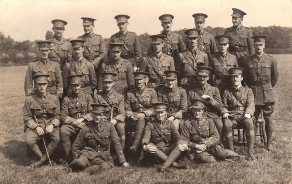
Officers of the 1/6th Bn Duke of Wellington's (West Riding Regiment) in 1915
Back row, left to right: –, –, –, Lieut. E.J.C. Supple, –, – Second row, left to right: –, –, –, –, Lieut. A.E.K. Slingsby, Lieut. H. Knowles, – Third row, left to right: –, –, –, –, –, –, – Front row, left to right: –, Lieut. C.H. Petty?, –
Courtesy of Roger Bancroft
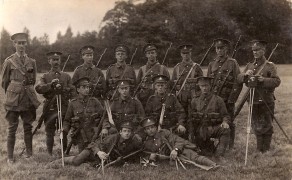
Signal Section, 1/6th Bn Duke of Wellington's (West Riding Regiment) in 1915
Back row: Lieut. A.E.K. Slingsby - 1st on left. Private Sam Bancroft - 2nd from right
Courtesy of Roger Bancroft
View Craven Herald Articles
View Craven Herald Articles

30 October 1914
OFFICERS GAZETTED
The following were gazetted on Wednesday:– 7th Battalion the Duke of Wellington’s West Riding Regiment – Captain Charles M. Bateman to be major (temporary) ; Lieutenant Kenneth Nicholson to be captain (temporary): Second-Lieutenant Anthony. E.K. Slingsby to be lieutenant (temporary).
28 May 1915
NEWS FROM A SILSDEN SOLDIER
In a letter to Mr. Ambrose Longbottom, of Kirkgate, Silsden, Private Sam Bancroft, of one of the Duke of Wellington's West Riding Regiments, says:–
“You will be wondering by now how I am getting on amongst it all. Well, I am still in the best of health, and have got accustomed to sleeping under all sorts of conditions. We have been in the trenches twice since I wrote to you last. The first time we were in three days, and then we came out to rest three days in a place where the Germans kept landing a few shells just to let us know they were alive. The second time we were in the trenches four days. We came out on Sunday night, and I expect we shall go in again on Wednesday. We don't get a big lot of rest when we are in the trenches, as we have to keep on the telephone and bullets keep catching the wire and cutting them, and then the fun starts in going out to mend them. I have been out a few times both day and night; it is not very nice to have bullets whistling round you, or a shell bursting not far off. They make us kiss the ground, but Mr. Slingsby always goes out with us, and do you know I would go anywhere with him.
“Well, you will like to know a little about the trenches and the way we get into them. The first time we went in we went down a road and you could keep hearing a bullet pass. There has been a few wounded while going down to the trenches. When we get about 200 yards off we go down the side of a high wall, and there is a good sniper or two who keep letting drive at the wall and we have to keep ducking. When we get into the trenches it is very safe unless we keep our head above the parapet too long. The parapet is about six feet high and made of sand-bags. Most of the firing goes on at night. Each side keeps sending up flares or star shells, and they make it as light as day. The trenches are very fair at present as we have had five days of very fine weather, but when we went in the last time it had been raining, and they were very bad. We were nearly up to the knees in mud. It must have been bad in winter as we had only a shower or two to make such a state of affairs as mentioned. Another thing that has been done now is that we have made a trench to go down instead of going down the road.
“How are the Boy Scouts getting on at Silsden? I had a P.C. from Mr. Berry, and he said they were going strong. I hope you have a good time if you go into camp anywhere. I am not doing bad for cigarettes. I have had a good few sent out, and we get a weekly allowance, which runs about 20 each, and one ounce of tobacco, so we are not doing bad. But we smoke nearly all the time, both day and night.”
Mr. Longbottom is Scoutmaster of the Parish Church Boy Scouts, of which Private Bancroft was formerly a prominent member.
23 July 1915
SLINGSBY – July 14th, 1915, killed in action, Anthony Edward King Slingsby, of the 6th Duke of Wellington’s West Riding Regiment, son of John Arthur Slingsby, Carla Beck, Carleton-in-Craven, Skipton, aged 26 years.
23 July 1915
ANOTHER SKIPTON OFFICER KILLED – LIEUT. A. E. K. SLINGSBY
There were many expressions of regret in the Craven district when it became known on Monday that Lieut. A. E. K. Slingsby, of the 6th Battalion Duke of Wellington’s West Riding Regiment, son of Mr. J. A. Slingsby, J.P., and Mrs. Slingsby. of Carla Beck, Carleton, had lost his life while serving his country. The sad intelligence reached Carleton from an unofficial source on Sunday morning and was subsequently confirmed by the military authorities.
Lieut. Slingsby, who was well-known and very popular in this neighbourhood, was first at school at St. Edmund's, Hindhead, Surrey, and subsequently at St. Peter's College, Radley, near Oxford. He then won an Exhibition at Exeter College, Oxford. where he remained in residence four years. During his stay Lieut. Slingsby was Captain of Boats, and President of the College Committee.
Returning to Carleton. he interested himself in the Boy Scout movement, taking over the command of a troop which had been formed in connection with Christ Church, Skipton. Then he became a District Commissioner and later was attached to the Headquarters Staff. Lieut. Slingsby did much to popularise the movement in Craven. He quickly brought his own troop to a state of high efficiency; in fact, for several years they practically carried all before them in the way of trophies at local contests. He instilled into the boys a fine, manly spirit, and there sprang up between them a strong attachment, which was demonstrated in practical fashion when, on Lieut. Slingsby obtaining a commission in the 11th Battalion, the elder lads left the Scouts to go over with him to the Territorials.
The interrupted manoeuvres at Marske in July of last year were the first Lieut. Slingsby attended as a Territorial officer. He mobilised with the Battalion in August, and, after training with them, left for the Front about three months ago. On several occasions since then Lieut. Slingsby has been offered a staff appointment, which meant personal safety, but he refused to leave his ‘boys.’
Information of the sad occurrence arrived at Carleton in a letter received on Sunday morning from a village lad who was formerly groom to Mr. Slingsby at Carla Beck, and is now servant to the Rev. Howard Hall, the Battalion Chaplain. The letter stated that Lieut. Slingsby was killed on July 14, and the writer added that he was just going with his master, ‘The Padre,’ to the funeral.
Mr. Slingsby made inquiries at once at the War Office: the Record Office, York; and of Lieut. Slingsby’s bankers. At 6 p.m. the suggestion of the War Office was that the information should be treated as a rumour, but at 7-30 the Record Office telephoned stating they had heard from the War Office that Lieut. Slingsby had been killed. Absolute confirmation was forthcoming at 9-45 p.m. in the shape of a telegram from Lord Kitchener to the effect that Lieut. Slingsby was killed on July 14th and expressing his sympathy with the family.
Subsequent information which has reached the family shows that Lieut. Slingsby was killed instantaneously by a German sniper while attending to the wires in a shallow trench on the Ypres Canal. At the interment the mourners included the deceased officer’s younger brother and a cousin.
Lieut. Slingsby, who was 26 years of age, was one of four brothers serving their King and Country in the present war. The three survivors are: A. M. Slingsby, Captain & Adjutant 56th Rifles, F.F. (I. A.); S. H. Slingsby, Sub-Lieutenant in the Royal Navy: and P. B. Slingsby, Second-Lieutenant Army Service Corps.
An Officer’s Testimony
An officer of one of the West Riding Brigades, writing under date July 16th and 17th, refers to the death of Lieut. Slingsby, and says: ‘‘One of Lieut. Slingsby’s men had been wounded by a minenwerfer in our front trenches, and he went to talk to him, and comfort him generally. I suppose he did not realise that a lot of the parapet had been blown down, and he got up and was killed. A most gallant chap, and excellent signalling officer, who ought to have been on our staff, but he would not leave his own men. They were devoted to him, And when he was buried by the Rev. S. Howard Hall, senior chaplain, the men broke down entirely and sobbed like children.’’
AN APPRECIATION
A few brief lines of appreciation in addition to the bare facts recorded above, by one who had had the privilege of his acquaintance, may fittingly be added. Lieut. Slingsby disliked fuss and ostentation, and it would not have been his wish that eulogistic reference should be made to his qualities or achievements. His life, however, was an example to others, and as such it carries a moral that ought not to be obscured. Possessed of a charming personality, endowed with high mental and intellectual attainments, he refused to ‘enjoy life,’ in the commonly accepted meaning of the term, and devoted himself to one ideal, the encouragement of a manly patriotism among the boys. The potentialities of the Scout movement took a firm hold upon his imagination. He seized the opportunity, and despite many criticisms from those who suspected in the movement an objectional phase of militarism, he devoted himself body and soul to inculcate in the Boy Scouts loyal patriotism and devotion to King and Country. A sound mind in a sound body was his aim, and he reaped his reward in seeing the Scout movement grow to gigantic proportions. He was encouraged by the ever increasing confidence shown by the public; and lived to see the suspicion with which the institution was faced in its initial stages immersed in a glow of popular approval.
To see Lieut. Slingsby among his boys either at Carla Beck on the occasion of a demonstration or at their headquarters in Skipton was to realise the secret of his success. He possessed the happy faculty of entering heartily into the lads’ ideas and amusements; he inspired confidence because he was a ‘pal’ among ‘pals’; he believed in their capacity to rise above the ordinary level of youthful pursuits and pleasures; he was ever urging them, both by precept and example, to be clean in mind and body. Commissioner Slingsby's duty did not end with either Scout practices or reviews. He knew intimately the daily lives and occupations of the lads; he was a frequent visitor and always a welcome one to their homes; and the writer could cite many cases where the material prospects of the Scouts have been substantially improved by the deceased officer's influence and kindly thought.
But Lieut. Slingsby's efforts were not confined to this part of Craven. It will be news to many of our readers that he had, since leaving College, been mainly responsible for the maintenance of a Boys’ Club in the East End of London. Here, as at home, he devoted his talents to developing the nobler side of a boy's nature, instilling lofty ideals into their minds, and encouraging them to become manly men and patriotic citizens of a Great Empire.
Lieut. Slingsby himself was a manly Christian soldier. The influences of his home life ever clung to him in his all too brief career. He possessed a broad outlook on life, but withal had a stern sense of duty. It was this sense that impelled him to join the Territorial Force and volunteer for active duty, and no greater tribute to the success of his influence among the Scouts could be cited than that involved in the fact that all the local Scouts of military age threw in their lot with the West Riding Regiment, and had been associated with him in the signalling section during the operations at the Front.
The family have been inundated with messages of sympathy from those in the humblest social scale as well as those in the highest. Apart from the inevitable wrench and its pain, Mr. and Mrs. Slingsby are proud of a son who has willingly sacrificed his earthly career for an Empire to which he was devotedly attached; and the public of the Craven district are also proud to know that one of her sons has shown, equally with others in the immediate locality, a spirit of loyalty to King and Country that cannot fail to bear good fruit.—J. T. C.
SKIPTON URBAN COUNCIL’S SYMPATHY
At the monthly meeting of the Skipton Urban District Council on Tuesday reference was made to the loss that the 6th Battalion Duke of Wellington's West Riding Regiment had sustained by the deaths of Lieut. A. E. K. Slingsby and Lieutenant Hedley Knowles.
Mr. J. L. Kidd, in moving a vote of condolence, said the fathers of both these young officers were very prominently identified with public life in Skipton, and he felt sure their many friends would sympathise very keenly with them in the loss each had sustained.
Captain Charlesworth, in seconding, said it seemed but as yesterday that he was at Doncaster taking leave of the 6th Battalion before they departed with the new Expeditionary Force to France. He spent a week living with the Battalion and brought almost hourly into contact with the officers and with those to whose loss reference had been made. He felt that in a matter of this sort their sense of loss and sympathy should go out to the relatives (hear, hear), but he could not help feeling and giving expression to another thought besides that of sorrow in connection with the cutting off of two young men almost at the entrance to their manhood. When they thought of the way in which human life often came to an end – how frequently it was the fate of a man to groan his life out on a sick bed, or how often it happened that life was taken away under circumstances not exactly creditable either to the one who went or those connected with the death – he could not help thinking that in a time of national emergency we should strike another note as well as sorrow in the expression of our feelings. “How can man die better…” asked the poet in singing of an ancient nation, and there was a world of truth in the words with which a daily paper headed its roll of honour “Who dies whilst England lives?” He ventured to think he should be expressing what was in the minds of his colleagues if he struck this other note suggested by his intercourse with those young officers before they went to fight the nation's battles in France and Flanders. They went out full of hope and courage, knowing perfectly well that in the ordinary course of battle there would be some who would not return. They went as we liked Englishmen to go, and he ventured to think that – although our sympathy must go out to the relatives left behind – we saw in a death like theirs something truly glorious. It sent a message – which was not unneeded in the nation – to the slackers who stayed behind, and gave us a feeling of glorious confidence in an issue fought by such men and in the struggle to which the Empire was committed.
Cr. J. Platt (Chairman) added a few words of condolence and the resolution was carried, the members rising in their places.
23 July 1915
SOLDIER’S TRIBUTE TO LIEUTENANT SLINGSBY
A private of the 6th West Ridings, formerly identified with the Skipton Bulldog Troop of Scouts, writing to his parents under date July 19th says:– “We have another nine or ten days to do here yet, and I shan't be sorry when we leave.
“I expect you will know all about Mr. Slingsby now. We have lost a good officer. Still it can't be helped. He always said to us he would be shot.
“We had a taste of the gas the other day; it's not pleasant stuff I can tell you.”
In another communication the same soldier says:– “We are up to the neck in puddle. The Germans have been throwing shells about all the time, and they never think of stopping. They sent us a few gas shells over yesterday, and they made my eyes smart a bit, but it was not much. We have got helmets to put on when they start gassing. Eight of us went to the funeral of Lieut. Slingsby.”
30 July 1915
THE LATE LIEUT. SLINGSBY – TOUCHING REFERENCE AT THE SKIPTON PETTY SESSIONS
Prior to the commencement of the ordinary business at the Skipton Petty Sessions on Saturday, Sir J.C. Horsfall, presiding, made a touching reference to the death of A.E.K. Slingsby in moving that a vote of sympathy be sent to the bereaved family. He said it was his painful duly to draw the attention of his fellow Magistrates to the great loss which had been sustained by one of their colleagues, Mr. John Arthur Slingsby. They all knew how faithful that gentleman had been in recognising his duty, and of the fine example he himself had set to their friends and neighbours in the Craven district by encouraging his men to serve their King and Country. Lieut. Slingsby, whose death they were mourning, was a man beloved by all who know him, and before he went out to the Front he was engaged very largely with the Scouts. He was so beloved by his men that when he went out, many followed his example. The speaker knew that since the deceased officer had been at the Front, he had been very popular with all whom he came in contact. Letters received from his (the speaker's) own son spoke in the highest terms of Lieut. Slingsby, and in his work as a signaller it was impossible to replace him. It appeared that no other man could operate in that particular work. The speaker had also seen letters from several other officers, and they spoke very highly of Lieut. Slingsby. Though it was a terrible crisis for the young officer’s father and mother they had the satisfaction of knowing that he died a noble death, not only whilst in service of his King and Country, but whilst making his way to help and assist a wounded comrade. When passing part of the trench he was cut down by a sniper's bullet. They could only convey their deepest sympathy to the family in the great loss they had sustained and also to the many fathers and mothers in Craven who had lost sons. Some killed and others wounded. In conclusion, Sir John moved that Mr. Wood, the clerk, forward a letter of sympathy to Mr. and Mrs. Slingsby.
The proposition was seconded by Mr. J. W. Morkill, who said he could associate himself with every word that had fallen from the Chairman. He had known Lieut. Slingsby for some years, and he perhaps knew him better because he and his (the speaker's) boy, who had also fallen, were at school together. While Lieut. Slingsby lived he did his best for his generation, and everything that had already been said about him was absolutely true. Such matters as those of which they were speaking had two aspects, the first being the family and domestic aspect, and the other the national aspect. The first had caused in this country sorrow and misery almost untold; the other they must regard as merely incidental to the great end, which they were hoping to attain. Their hope was that the lives that were being sacrificed would bring about the end they all desired. In conclusion, he expressed his deepest sympathy to the parents of those men from the Craven district who had fallen in doing their duty.
The resolution was carried by the members of the Bench, silently rising in their places.
30 July 1915
LETTERS FROM THE FRONT – PRIVATE’S SPIRITED LETTER: An Appreciation of Lieut. Slingsby
Writing from the trenches in Belgium, under date July 20th, a private in the 6th Duke of Wellington’s West Riding Regiment says: “I am in the best of health and spirits, and I hope you are the same. You will have heard by now about Mr. Slingsby. He was shot through the head while laying a wire in a dangerous part of the trenches, in broad daylight! It was the biggest shock I have had yet – for a time it took all the breath out of us for you know what a decent chap he was, and you also know how he befriended his old scouts. He was our best friend, and the man we admired and loved better than any man we ever came across. He would never let us take any risk, and there was not a braver man in the fighting line - others have been recommended for doing less than he!
“Our division line lost rather heavily this last fortnight, and especially A Company (Skipton Company) in our battalion. S. Bishop is one of the killed: he was one of the jolliest fellows in the battalion. Our G.O.C. Major General Baldock has also been wounded. We feel the loss of these fellows keenly, but it adds to the score we have to pay off with those devils.
“They say that a cablegram arrived here this morning for Mr. Slingsby to tell him that the “Bulldogs” had won the shield. I don't know whether it is true, but I hope it is. I hope the Gala was a success… I think it rather rotten about the Welsh miners, it shows what weight Parliament carries: they do all the talking but never act.
“The fellows round here are sick of reading in the few newspapers they get ‘so and so’ is bringing in a Bill to do this and that and shorten the war, and then in big lines head ‘Lord Haldane attacks Mr.Lloyd George’ on such and such a question. The whole game in Parliament is shifting the blame off one person’s shoulders on to another’s, and blinding people to what they are going to do.
“The whole batch want kicking out, and some sound military men putting in their places. Kitchener should send for a division that has been out here for a good few months, and drive the Welsh miners and all such like back to their work in the same way they drive the Germans when they get the chance. It is not often I grunt about anything in my letters, but it is a grunt that every fellow would like to express that is out here to-day, be he a trade unionist, unionist, or whatever party he belongs in civil life, if he is a soldier in spirit as well as being one through patriotism.
“We are at war now, and although we have been at it for nearly twelve months those sentimental idiots in Parliament don't realise it yet. I would like someone to run amok with a fixed bayonet in the House of Commons, or rather let the Germans gas them: they won't even let us pay the Hun back in his own coin with gas, and the wind is in our favour nine times to their one.”
30 July 1915
MEMORIAL SERVICE AT THE SKIPTON PARISH CHURCH
An impressive service to the memory of the late Lieut. Slingsby took place on Sunday afternoon at the Skipton Parish Church, and was conducted by the Venerable Archdeacon Cook, who, in addition to referring to the deceased officer, made his remarks more general by applying them to other gallant soldiers from the Craven district who had fallen in action. The idea of the service originated from the Skipton Bulldog Troop of Scouts, of which Lieut. Slingsby was for some time Scoutmaster, and through the initiative of Scoutmaster Boyden, the Secretary of the Association, the various troops were communicated with. The Scouts present at the service numbered about 200, and comprised Skipton Bulldogs, Carleton, Skipton Grammar School, Skipton Parish Church, 1st and 2nd Silsden, and the Kildwick troop was represented by Assistant Scoutmaster and Mr. Thomas Appleby. The Barnoldswick troop, although not affiliated with the local Association, was also present.
The Scouts assembled at the clubroom of the Skipton Bulldogs, where they were marshalled by Scoutmaster Boyden, and afterwards marched by way of Coach Street and Water Street to the Parish Church. In addition to the Scouts there was a large number of persons present. The Scouts were attired in full uniform, and as a mark of respect they wore black bands round their hats, whilst the Scoutmaster and Assistant Scoutmaster wore similar black bands round their arms.
The Archdeacon read from the second book of Kings, 2nd chapter, 9th verse. “Ask what I shall do for thee, before I be taken away from thee. I pray thee, let a double portion of thy spirit be upon me.” In the course of a short address, the Archdeacon spoke of the high character which Lieut. Slingsby possessed, and referred to the great interest he took in the Scouts and boy’s clubs. What they ought to do to-day was to follow the noble example which he set.
The hymns sung during the service were ‘Fight the good fight’, ‘Onward Christian soldiers’, ‘O God our help in ages past’, and ‘Holy Father in Thy Mercy’ and the 30th Psalm was read. At the close of the service the Dead March in Saul was played by Mr. J. Turner Smith, the organist, and one verse of the National Anthem was sung.
20 August 1915
THE LATE LIEUT. SLINGSBY
The Clerk announced the receipt of a letter from Mr. J. A. S1ingsby, stating that he was grateful to the Guardians, the Officers, and the Clerk, for the vote of sympathy with himself and family on the death of the late Lieut. Anthony Slingsby. He was a true British soldier and died a noble death.
23 June 1916
CRAVEN AND THE WAR
Second Lieut. J. N. W. A. Procter, who is also mentioned in despatches for gallant conduct, is the second son of Mr. W. A. Procter, of Rylstone. He joined in November, 1914, trained with the 1st 6th Duke of Wellington’s Regiment, and went out to the Front August 2nd, 1915, to take up the duties of signalling officer in succession to Lieut. Anthony Slingsby.
04 July 1919
PEACE SUPPLEMENT TO THE 'CRAVEN HERALD' – CRAVEN'S FALLEN OFFICERS
LIEUTENANT ANTHONY E. K. SLINGSBY
6th Duke of Wellington’s Regiment, son of Mr. J. A. Slingsby, J.P., and Mrs. Slingsby, Carla Beck, Carlton, killed in action July 14th, 1915, aged 26 years. District Scout Commissioner for this district before the War and later attached to the Headquarters Staff.
View West Yorkshire Pioneer Articles
View West Yorkshire Pioneer Articles

23 July 1915
LIEUTENANT ANTHONY SLINGSBY KILLED
Lieutenant A.E.K. Slingsby of the 6th Battalion Duke of Wellington’s Regiment, son of Mr. J.A. Slingsby, J.P., and Mrs. Slingsby, of Carla Beck, Carleton, has been killed at the Front. The rumour first reached Skipton on Sunday afternoon when the news, which was not official, was brought by Carleton people to the Gala Field during the progress of the band performance.
Information of the sad occurrence arrived at Carleton in a letter received on Sunday morning from a village lad who was formerly groom to Mr. Slingsby at Carla Beck, and is now servant to Rev. Howard Hall, the Battalion Chaplain. The letter stated that Lieut. Slingsby was killed on July 14th (Wednesday of last week) and the writer added that he had just been with his master, ‘The Padre’ to the funeral.
The sad news having reached Mr. Slingsby from an unofficial source, inquiries were at once made at the War Office, the Record Office, York and of Lieut. Slingsby’s bankers. At 6 p.m. the suggestion of the War Office was that the information should be treated as a rumour, but at 7.50 the Record Office telephoned stating they had heard from the War Office that Lieut. Slingsby had been killed. Absolute confirmation was forthcoming at 9.45 p.m. in the shape of a telegram from Lord Kitchener to the effect that Lieut. Slingsby was killed on July 14th, and expressing his sympathy with the family.
Subsequent information which has reached the family shows that Lieut. Slingsby was killed instantaneously by a German sniper while attending to the wires in a shallow trench on the Ypres Canal. At the interment the mourners included the deceased officer’s younger brother and a cousin.
Lieut. Slingsby, who was well known and very popular in this neighbourhood, was 26 years of age and was first at school at St. Edmund’s, Hindhead, Surrey and subsequently at St. Peter’s College, Radley, near Oxford. He then won an Exhibition at Exeter College, Oxford, where he remained in residence four years. During his stay Lieut. Slingsby was Captain of Boats and President of the College Committee.
Returning to Carleton, he interested himself in the Boy Scout movement, taking over the command of a troop which had been formed in connection with Christ Church, Skipton. Then he became a District Commissioner and later was attached to the Headquarters Staff. Lieut. Slingsby did much to popularise the movement in Craven. He quickly brought his own troop to a high efficiency; in fact, for several years they practically carried all before them in the way of trophies at local contests. He installed into the boys a fine, manly spirit and there sprang up between them a strong attachment, which was demonstrated in practical fashion when, on Lieut. Slingsby obtaining a commission in the 6th Battalion, the elder lads left the Scouts to go over with him to the Territorials.
The interrupted manoeuvres at Marske in July of last year were the first Lieut. Slingsby attended as a Territorial officer. He mobilised with the Battalion in August, and after training with them, left for the Front about three months ago. On several occasions since then, Lieut. Slingsby has been offered a staff appointment which meant personal safety, but he refused to leave his ‘boys’.
His courage and devotion to duty at the Front, as well as his popularity with his men, have been commented on by those who have written home, and by his death the nation has lost a gallant and promising officer.
Mr. and Mrs. Slingsby have the deep sympathy of everybody in the great loss which they have sustained.
An officer writing of the funeral of Lieut. Slingsby, says:– “When he was buried by the Rev. S. Howard Hall, senior chaplain, the men broke down entirely and sobbed like children.”
30 July 1915
A PRIVATE’S APPRECIATION OF LIEUT. SLINGSBY
Writing to his parents from the trenches in Belgium, under date July 25th, a private in the 6th Duke of Wellington’s West Riding Regiment says:– “You will have heard by now about Mr. Slingsby. He was shot in the head while laying a wire in a dangerous part of the trenches, in broad daylight. It was the biggest shock I have had yet. For a time it took the heart out of all of us, for you know what a decent chap he was. And you also know how he befriended his old Scouts. He was our best friend, and the man we admired and loved better than any man we ever came cross. He would never let us take any risk, and there was not a braver man in the fighting line. Others have been recommended for doing far less than he!
“Our division has lost rather heavily this last fortnight, and especially ‘A’ Company (Skipton Company) in our battalion. S. Bishop is one of the killed. He was one of the jolliest fellows in the battalion. Our G.O.C., Major General Baldock, has also been wounded. We feel the loss of these fellows keenly, but it adds to the score that we have to pay off with those devils.
“They say that a cablegram arrived home this morning for Mr. Slingsby to tell him that the ‘Bulldogs’ had won the shield, but I don’t know whether it is true, but I hope it is. I hope the gala was a success. . . . I think it rotten about the Welsh miners; it shows just what weight Parliament carries. They do all the talking but never act. The fellows out here are sick of reading in the few newspapers they get that ‘so-and-so’ is bringing in a Bill to do this and that, and shorten the war, and then in big headlines ‘Lord Haldane attacks Mr. Lloyd George on such and such a question.’ . . . . Kitchener should send for a division that has been out here for a good few months, and drive the Welsh miners and all such like back to work in the same way they drive the Germans when they get the chance. It is not often I grunt about anything in my letters, but it is a grunt that every fellow would like to express that is out here today, be he a trade unionist, Unionist or whatever party he belongs in civil life, if he is a soldier in spirit as well as being one through patriotism.”
30 July 1915
SCOUTS’ MEMORIAL SERVICE TO LIEUT. SLINGSBY – AN IMPRESSIVE OCCASION
In token of their sorrow at the death of Lieut. A.E.K. Slingsby, who might well have been called the leader of the Scout movement in the Skipton district, the various troops of Boy Scouts in the neighbourhood attended a memorial service, which was held in Skipton Parish Church on Sunday afternoon. The troops met at the clubroom of the late Lieut. Slingsby’s own troop, the ‘Skipton Bulldogs’, the following being present under their various scoutmasters:– Skipton Bulldogs, Skipton Parish Church, Carleton, 1st and 2nd Silsden, Crosshills, Barnoldswick, Skipton Grammar School, and Scoutmaster James Lee (representing the Kildwick troop). From the clubroom the Scouts, who altogether numbered close on 250, and were under the leadership of Scoutmaster Boyden (of the Bulldogs), marched in fine order through the town to the Parish Church. A large congregation had assembled to show their respect for the deceased and the church was well filled.
Ven. Archdeacon Cook conducted the service, which was of a very impressive nature. Special hymns were sung and an appropriate address was delivered by the Archdeacon, who dwelt upon the great loss that the Scout movement and the countryside had sustained by the death of Lieut. Slingsby, and urged the boys to profit by and follow the worthy example which his life afforded.
After the service the Scouts marched back through the town to the clubroom in Coach Street.
06 August 1915
PRAISE FOR DEAD SKIPTON OFFICERS
Mr. F.S. Smith, of Woodland, Skipton, has received an interesting letter from a friend of his who is fighting in the trenches, in which he says that he is getting on very nicely up to date, and so far has managed to dodge all that has been flying about. He continues:– “We have just come up this way and are in a very warm corner. We have spent five days in the front line trenches with the Germans only seventeen yards away in one spot, which makes things unpleasant. We are now a little way back (under a mile) living in dug-outs, and it is nearly as bad as in the front line. They shell us all day and night as well. After five days here we go back to the front trenches for another five, so we have fifteen days without being able to take off our clothes. After that we have five days further back, where we shall only get a shell now and again, unless they get us really spotted.
“Poor Knowles was in our battalion and quite a pal of mine. It was an awful blow to us all. He was the battalion bombing officer, and was accidentally killed by a rifle grenade. How it happened is a mystery which I am afraid will never be cleared up. He was a fine fellow, a good officer, and very popular with both officers and men. You will have heard by now that Anthony Slingsby, of Carleton, has been killed. He was shot in the head by a German sniper and killed on the spot. He was our signalling officer, and knew his job better than any other man in the division. I am afraid we do not seem to be getting nearer the end of the war. I suppose it cannot last for ever, but this trench warfare puts a stop to all rapid progress, but we shall manage to wear them down at the finish. I have been under gas once properly about three hours, and it is not at all pleasant, but we are fairly well protected against it now by our gas helmets. I did not feel any after-effects anyhow…The men are all keeping cheerful, and are doing splendidly. The food we get is good and wholesome, but rather plain, and one gets tired of the same thing over and over again.”
20 August 1915
A TRIBUTE TO THE LATE LIEUT. SLINGSBY
Major General Baden Powell, writing in the current issue of the ‘Boy Scouts Headquarters Gazette’ pays a high tribute to the late Lieut. Anthony Slingsby, of Carleton, who was killed in action in France on July 14th. He stated that by the death of Lieut. Anthony Slingsby the movement had lost one of its keenest and most enthusiastic workers, and he had gained for it many adherents and sympathisers, who had hitherto been blind to its ideals. In his short life he had done good that many older men might envy, and his death was a fine example to the multitude of lads who had known and loved him. He had not lived in vain but had put his duty before all, and died in improving his profession.
Lieut. Slingsby was District Commissioner of the Keighley district area, and Mr. F. Mahoney, Scoutmaster of the Keighley St. Anne’s Troop, has been appointed to fill the vacancy.
Second-Lieut. Philip Slingsby, of the West Riding Division of the Army Service Corps, arrived in England from the Front on Wednesday on a seven days’ leave.
24 December 1915
CRAVEN’S ROLL OF HONOUR – CARLETON
Lieut. A.E.K. Slingsby, 6th West Riding (Duke of Wellington’s) Regiment, son of Mr. J.A. Slingsby, J.P., and Mrs. Slingsby of Carla Beck, Carleton, killed in action on July 14th. Twenty-six years of age.
Comment on this Soldier Record
You can leave comments on this soldier record. Please note all comments will be manually approved before they appear on the website.

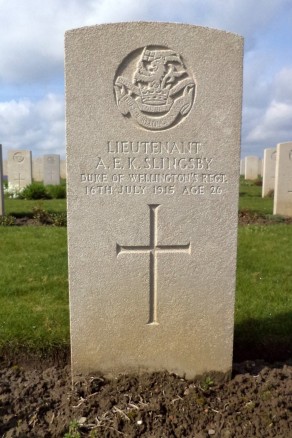
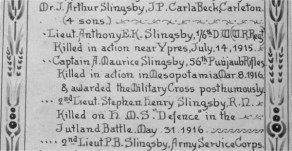
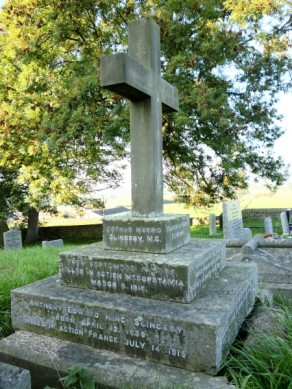




No comments yet.